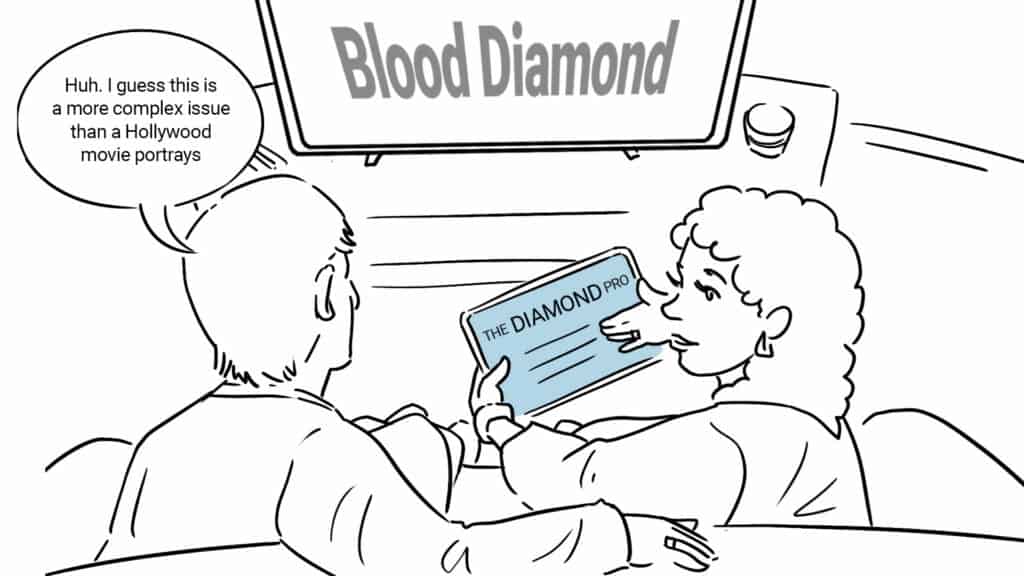We are reader-supported. Buying through any red colored link on our site may earn us commissions. Learn More.
Up to 30% off engagement rings and select jewelry at James Allen!
A conflict-free diamond means a diamond that’s mined and shipped without connection to rebel or terror groups. Procedures and agreements like The Kimberley Process are in place to guarantee that diamonds are mined and shipped according to certain ethical standards.
Diamonds that don’t abide by these practices are referred to as blood diamonds or conflict diamonds. Blood diamonds often originate in war-torn areas and are illegally traded. These diamonds gained attention during the Sierra Leone civil war in the 1990s, which was depicted in the 2006 movie Blood Diamond—showing how rebel groups engaged in brutal tactics to smuggle and sell diamonds.
Conflict-free—or cruelty-free diamonds—are safely mined. When you get a conflict-free diamond, it means it follows a process that prevents any societal and environmental harm. Luckily, there are several diamond vendors who offer ethical, conflict-free diamonds and engagement rings.
Why you should trust us
Bottom Line Recommendation: Choosing a conflict-free diamond certified by the Kimberley Process ensures that the stone isn’t connected with rebel groups. We recommend going a step further, though, to ensure your diamond is mined and shipped in the most ethical way. That’s why we encourage our readers to consider ethically sourced diamonds from Blue Nile and James Allen and recycled diamonds. You can find a stunning diamond that comes with the peace of mind in knowing that you’re making a socially and environmentally-friendly purchase.
For help in finding a beautiful conflict-free diamond at an excellent price, reach out to our experts.

What is The Kimberley Process?
After the Sierra Leone war and continued conflict in Africa, the diamond industry partnered with the United Nations to implement the Kimberley Process Certification Scheme. The Kimberley Process developed requirements and regulations to ensure diamonds are mined and shipped humanely—and that criminal activity is not further supported.
Participating countries, including the United States and over 70 others, now closely monitor incoming diamonds from mining and cutting to the final purchase. Each diamond receives a Kimberley Process certificate—verifying that the diamond is conflict-free. With the widespread adoption of The Kimberley Process, the number of conflict diamonds and associated crimes have dropped considerably worldwide.
According to the Gemological Institute of America (GIA), since a coalition of governments, non-governmental organizations and the diamond industry established the Kimberley Process, “99% of diamonds in the marketplace are conflict-free.”
The Kimberley Process is taken seriously by the diamond industry, NGOs and governments. In the United States, it’s enforced by the State Department’s Office of Threat Finance Countermeasures in the Bureau of Economic and Business Affairs under the Clean Diamond Trade Act of 2003.
You can read more about the Kimberley Process, as well as how it’s enforced in the United States, on the US State Department website.
Conflict-Free vs. Ethical Diamonds
By choosing a conflict-free engagement ring, like this beautiful 1 Carat Cushion Cut ring from James Allen, you’re supporting ethical diamond mining practices. Most jewelers offer conflict-free diamonds, because many countries, including the United States, make it illegal to sell and trade conflict diamonds. Certain jewelers, however, take their efforts further to ensure that a diamond is mined and shipped ethically.
What do we mean by this?
While The Kimberley Process has significantly reduced the number and viability of conflict diamonds, consumers should still be aware that such diamonds don’t always meet the highest ethical standards. Artisanal miners in Africa, for example, are generally very poor and utilize simple equipment. Because these small-scale miners often operate outside of legal standards, the working environments can be unsafe and the processes cause significant environmental degradation. In some cases, child labor may even be used.
That’s why it’s important to be careful about where you shop for diamonds and engagement rings. By choosing a reputable vendor who’s known for ethically sourced diamonds, you can have peace of mind knowing your diamond is conflict-free and ethically sourced.
Ethical Alternatives to Diamonds
There can be challenges with finding conflict-free diamonds, but there are options out there. To ensure you’re buying a stone that doesn’t violate human rights, consider the choices below. You can find a beautiful diamond or gemstone that also helps to make the world a better place.
Recycled Diamonds
In addition to newly mined diamonds, you may also wish to consider recycled diamonds for your engagement ring.
Recycled diamonds are previously owned and put back into the diamond supply chain. Because they’re repurposed and not newly mined, there’s nearly zero environmental and social impact. Recycled diamonds are, therefore, eco-friendly and ethically sourced.
Some recycled diamonds are antique cuts—offering a vintage or European appearance. Other recycled diamonds are stunning modern cut diamonds that have been recut and repolished.
Most importantly, we recommend purchasing your recycled diamond from a highly reputable and trustworthy vendor. Abe Mor has provided many of our readers with beautiful recycled diamonds at excellent prices. You can contact them directly to start a search for a stunning recycled diamond engagement ring within your budget.
Recycled Diamonds on Abe Mor
This email
Canadian Diamonds
Canada is newer to diamond production but has become a major source of quality diamonds. Most Canadian diamonds are mined following the country’s strict environmental guidelines and fair labor laws. CanadaMark diamonds can be traced from their mine to their vendor with a unique ID number.
While Canada follows strict guidelines, by buying a diamond from them, you detract business from African communities that rely on the diamond industry for their wellbeing. Choosing a conflict-free Canadian diamond is a fine choice, but there are other options that support Africans and their livelihood.
Kalahari Dream
A new, optimal alternative has hit the market for conflict-free diamonds: Kalahari Dream. These diamonds support African communities that rely on the diamond industry and they’re 100% ethically sourced.
Kalahari Dream is a venture of De Beers. They sell diamonds directly to the consumer that they’ve bought directly from south African mining companies like Lucara, Debswana, and ODC.
With a Kalahari Dream diamond, you avoid all ethical pitfalls. The company owns all the diamonds from the initial purchase through to the polishing stage that takes place at local factories. The process is airtight and offers immense good for the people of Botswana.
Lab-Created Diamonds
When looking for non-conflict diamonds, some people might consider a lab-created diamond. Lab-created diamonds, also known as artificial diamonds, resemble diamonds in their chemical and visual characteristics but are not real or natural. We don’t recommend lab-created diamonds for many reasons, including their plummeting resale value. Read our full article on lab-created diamonds here.
Gemstone Alternatives
While many desire a diamond engagement ring, some people are drawn to the more colorful, unique nature of gemstones, such as sapphires and emeralds. In general, colored gemstones pass through fewer hands than diamonds, but they still can be produced in unsafe working conditions. That’s why we recommend purchasing a gemstone from a reputable vendor like Blue Nile, James Allen or Leibish & Co.
Conflict-free gemstone engagement rings:
- 1.3 Carat Ruby Halo Engagement Ring from James Allen
- 2.25 Carat Blue Sapphire Engagement Ring from Leibish & Co.
- 1.3 Carat Green Emerald Engagement Ring from James Allen
Conflict-Free Engagement Rings
From online collections of new diamonds to vintage recycled stones, there are several excellent options for finding conflict-free, ethically sourced engagement rings. Browse these options to find the right fit for you.
Highly Reputable Online Vendors
Throughout our extensive experience in the diamond industry, we’ve become well-attuned with which companies you can trust and which ones you should steer clear of. This goes for conflict-free and ethical diamonds as well. We recommend two online vendors, Blue Nile and James Allen, because they’re highly committed to choosing ethically sourced diamonds—and offer high-quality diamonds at competitive prices.
Blue Nile Conflict-Free Diamonds
Blue Nile maintains a zero-tolerance policy toward conflict diamonds. They abide by The Kimberley Process and only work with suppliers who also adhere to those standards. Blue Nile goes a step further to ensure responsible mining for all of their diamonds, which come from Canada, Russia, Australia, and Africa. They also ensure that their precious metals and gold are obtained from respected suppliers who meet high social, environmental and human rights criteria.
Beautiful conflict-free engagement ring from Blue Nile:
James Allen Conflict-Free Diamonds
Not only does James Allen strictly adhere to The Kimberley Process for all of their diamonds, but also the Patriot Act and the United Nations resolutions. Their internal guidelines exceed these government requirements, too. James Allen has binding contracts with their suppliers to guarantee all diamonds comply with all applicable laws and are certified conflict-free. They only purchase polished diamonds from sources which are members of the professional diamond trade. James Allen is also the exclusive online vendor of Canadamark diamonds, giving consumers an excellent avenue for purchasing ethically sourced and earth-friendly diamonds.
Example of a beautiful conflict-free engagement ring from James Allen:
Want help in finding a beautiful conflict-free diamond at an excellent price? Reach out to our experts today.

- No questions asked returns within 30 days of shipment. James Allen will send you a paid shipping label to return the ring.
- Lifetime Warranty
- Free International Shipping
- Free prong tightening, repolishing, rhodium plating and cleaning every 6 months
- Provide insurance appraisals
- One free resizing within 60 days of purchase
- Free ring inscriptions
- Best-in-class high quality imagery of all diamonds in stock
- 24/7 Customer Service
- Best-in-class packaging


- No questions asked returns within 30 days of shipment. Blue Nile will send you a paid shipping label to return the ring.
- Lifetime Warranty
- Free Shipping
- Free prong tightening, repolishing, rhodium plating and cleaning every 6 months
- Provide insurance appraisal
- One free resizing within the first year of purchase
- High quality images of about half of their diamonds
- 24/7 Customer Service
- 100% credit towards future upgrades (must be at least double in value)
- Best in class fulfillment

Still afraid of getting ripped off?
Before you buy a diamond, get personal buying advice from industry veterans. We'll help you get the best diamond for the money.
Ask your diamond purchase question here
DISCLAIMER: We don't use your email for marketing. Period.
You Might Like
Diamond Prices: A Complete Guide
A diamonds’ price is determined primarily by the 4 Cs of the diamond. On the wholesale level, diamond prices are first based on a diamond shape and
The Best Places to Buy Engagement Rings
Buying an engagement ring is often one of the first major purchases in a person's life. The process can be fraught with tension as there are so m
1 Carat Diamond Price & Buying Guide
A wide range of 1 carat diamonds exist both in online markets and local diamond jewelry stores. Not only are there significant differences in beauty







